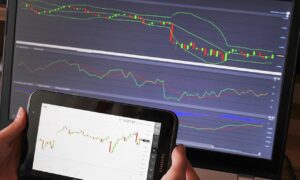Forex trading is an exciting financial market that can be both rewarding and challenging. Therefore, as a beginner, it’s important to have a solid understanding of the forex market. In this article, we are going to talk about the 10 most essential tips that will help you navigate the market with ease.
Let’s get started!
Choose The Right Broker
Finding a suitable broker is a tip that has little to do with trading itself, but it’s vital if you want to get your feet wet in the forex market.
Don’t just choose the first fx broker you come across online. Take some time to research several brokers, evaluate them, compare their features, and read reviews to make sure you select the best one for your trading style.
Any forex broker that you will find on the forex market will have particular benefits and drawbacks. But there are certain crucial elements to consider when selecting a broker, including the level of security offered by the forex broker, the trading instruments provided, customer service, educational materials, transaction costs, and a whole lot more. Make sure the broker you select is authorised and regulated by a globally renowned authority in addition to these and other vital considerations.
Remember that you have a choice of hundreds of brokers, each being distinctive in some respects. So, you should do your research to avoid selecting a broker who is inappropriate for your needs.
Create a Trading Plan
When it comes to forex trading, having a solid plan in place is essential to success. Many traders are eager to jump straight into trading without taking the time to create a clear plan. However, failing to prepare is preparing to fail, and forex trading is no exception.
Your trading plan should be like a set of rules you can follow, outlining your goals, trading style, time commitment, risk management, and market entry and exit strategies.
Without a plan, you are more likely to make poor decisions based on emotion rather than logic. However, a forex trading plan will outline your goals and enable you to approach trading objectively and confidently, regardless of the market’s direction. Note that having a plan is not enough – you need to stick to it religiously and analyse its performance to identify when changes are necessary. By taking a disciplined approach to trading, you’ll be better equipped to stay on track and achieve your goals.
Take Small Steps
Regarding forex trading, starting small and practising is a crucial tip for novice traders. Many traders make the mistake of jumping straight in without thinking, but there are better approaches than this. You must take your time, think things through, and start small.
When you start trading, it’s essential to begin with the basics and gradually build your confidence. One way to do this is by starting on a demo account. It’s natural to feel tempted to get your funds in line to earn real profits from your forex trades, but it’s important to remember that beginner’s luck is just an illusion in forex trading. When you start, you will likely lose money on some trades and make money on others. By practising well enough on a demo account and then transitioning slowly to a micro account, you can minimise your losses and gain experience without exposing yourself to too much risk.
Take your time, be patient, and stay disciplined – it will pay off in the end.
Keep a Trading Journal
Most traders believe maintaining a trading journal is unnecessary as almost every trader provides trading history, which records past trades in real-time. Still, keeping a trading journal can be extremely useful as it can help you keep track of more than just your position size, traded currency pair, outcome, date and time of the trade.
A solid trade journal should include your strategy, your reason behind taking the trade, technicals and fundamentals you took into account for executing a specific trade. You can also add price charts to your trading journal. Including additional details can certainly make assessing the trading journal worth it. You can also write down your plan for the next trade.
In other words, the trading journal acts as a tool to record your ideas in concrete numbers and serves as the cornerstone of a process for arranging your trade and then actually trading it.
Learn to Use Leverage Properly
Leverage is a really attractive tool that lets you multiply your returns without investing additional money. However, all good things come at a price. While the upside of using leverage is that you can earn greater profits than you could otherwise have made if you were trading with the capital on hand, the downside is that you can also lose more money than you can lose if you trade with your own capital.
It amplifies your profits in a winning trade and magnifies losses in a losing trade. This is why professional traders typically use relatively little leverage when trading.
Lowering your leverage keeps your returns steady and protects your money in the event of lost trades. Therefore, it is best to employ less leverage. Knowing when to utilise and when not to use leverage effectively requires experience. You’ll stay in the game for a long time if you exercise caution while using leverage.
Work on Your Risk Management Strategy
Risk management can determine your success or failure in the market. To effectively manage your risk, it is important to consider various factors such as your age, knowledge, experience, investment goals, and, most importantly, your risk tolerance.
Your risk tolerance refers to the amount of risk you are willing to take in your trading activities, which is influenced by your circumstances and financial objectives. To ensure you are trading within your risk tolerance, you should always keep your trades within a conservative level of your available trading capital, especially if you are a novice trader likely to make more mistakes.
A good rule of thumb is to limit your risk per trade to no more than 2% of your trading capital. This approach limits your potential losses and increases your chances of success as you can make more trades while minimising the risk of wiping out your account.
In addition, it is important to practise sound risk-reward ratios (RRR), which means risking a small portion of your trading capital to gain a higher return potentially. By managing your risk effectively and adhering to these principles, you can help protect your trading capital and achieve your financial goals.
Follow Money Management Rules
Successful forex trading is not just about making large profits but also about preserving your capital. The primary rule of trading is to defend your funds. The reason for most traders’ failures is that they need more money and blow out their accounts before they can enter a potentially profitable trade. By preserving your trading capital and avoiding crippling losses, you can continue trading, allowing you to enter a profitable trade eventually.
Discipline is crucial when things are going well and when they are going badly. Traders should avoid overtrading or taking too much risk in any trade. Avoiding large losses is more important than making large profits; the best way to do that is to manage your money wisely.
You can work on a 50/50 basis, making a profit on at least 50% of executed trades. Before placing a trade, determine how much money you’re prepared to lose, and aim to make at least double that on the profit side. This way, you can make an overall profit in the end. But for that to be successful, you will also need to control the urge to take a profit as soon as you see one.
Ultimately, if you can just preserve your trading capital, you will eventually come across a trade that produces more than enough profit to make your trading career a massively profitable success.
Maintain Emotional Equilibrium
Maintaining emotional balance is crucial while trading forex. Every trader experiences fear and greed, and both emotions can have a big impact on your trading choices. While greed can encourage you to take excessive chances and possibly lose money, fear can stop you from taking any risks at all.
Recognise these feelings and make use of them for your benefit. You can employ specific strategies to keep your emotions in check. Setting reasonable profit targets and stop-loss levels, for instance, can assist you in maintaining focus and preventing anxiety from influencing your trading selections.
Also, maintaining a trading plan might assist you to avoid making snap judgements motivated by greed or fear. It is essential to refrain from overtrading and taking unwarranted risks. Take a step back and re-evaluate your circumstances if you feel fear or greed during trading before making any decisions.
Another strategy is to use breathing exercises, and mindfulness exercises both before and during trading. To relax your thoughts and lessen stress, take deep breaths and concentrate on the here and now. Remember that trading is a long-term endeavour, and success depends on your ability to practise discipline and patience.
Find a Suitable Trading Method
Each trader has his own style and preference that may not be suited for other traders. Finding a trading approach and style that complements a person’s personality, trading expertise, and experience is so essential. Whether you like to trade cryptos, forex or any other instrument, knowing what kind of trader you are is crucial. You can select a trading strategy that best fits your preferences and way of life using this knowledge.
Having a trading strategy that works for your schedule and lifestyle is also essential. A longer-term trend trading strategy can be the ideal choice for you if you are a part-time trader with limited time. However, an intraday trading strategy that demands traders to remain focused on a short time period may be better suited if you enjoy keeping up with the most recent market news and price fluctuations.
Keep Learning
In the world of forex trading, the only constant changes. New information, trends, and market movements emerge daily, and successful traders must stay up-to-date with the latest developments to succeed. Strategies that worked yesterday might be less effective today. Therefore, traders must have the knowledge and skills to adapt and adjust their strategies accordingly.
Some good ways to continuously educate yourself are by attending webinars, taking online courses, watching educational videos, reading books, and more. Since the forex market is complex and constantly evolving, traders need to learn more about it. However, by keeping themselves updated with the latest developments in the market and continuously refining their skills, traders can stay ahead of the game.
Which is the most important tip that you got as a forex trader? Do comment and let us know!



































